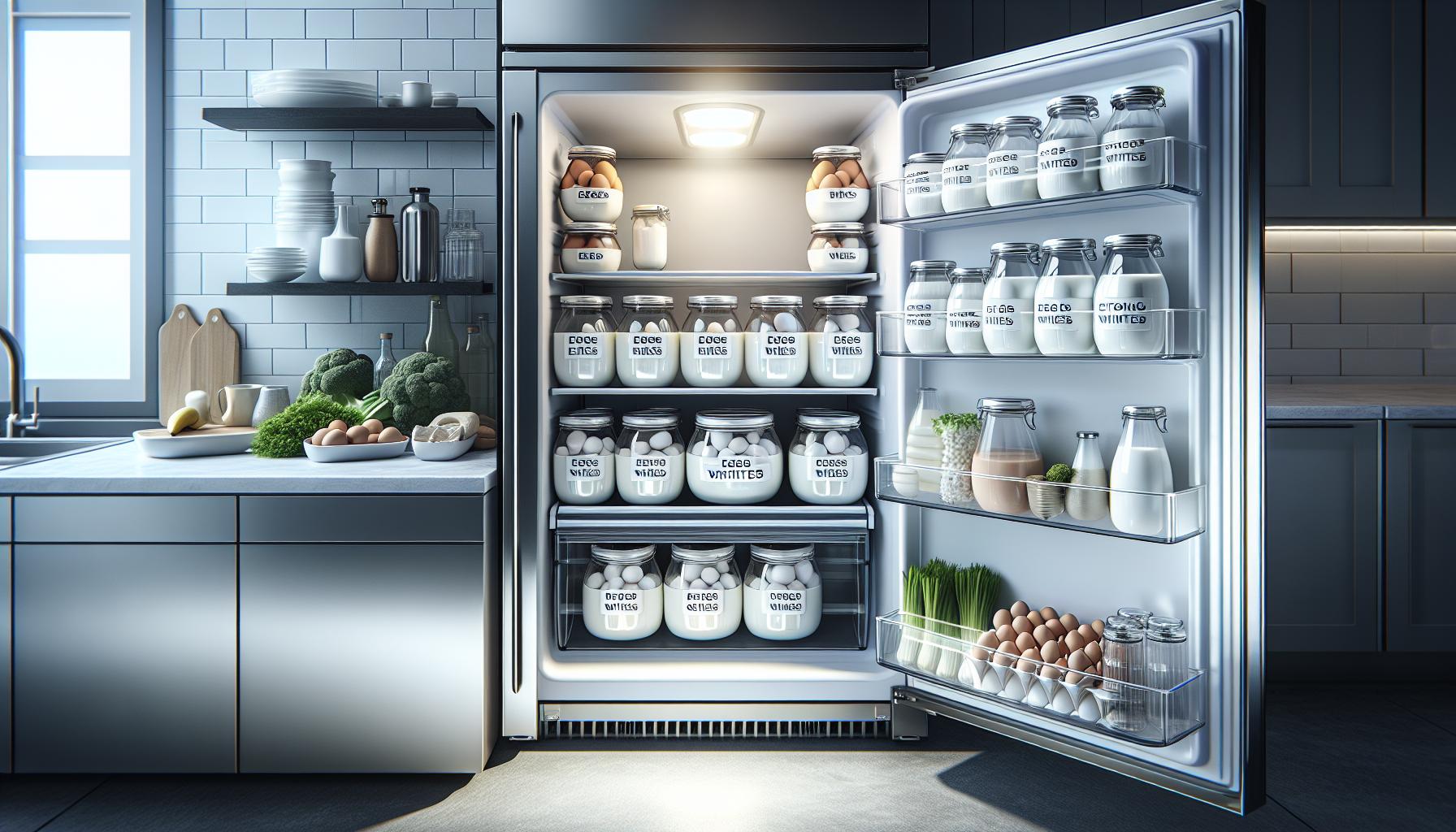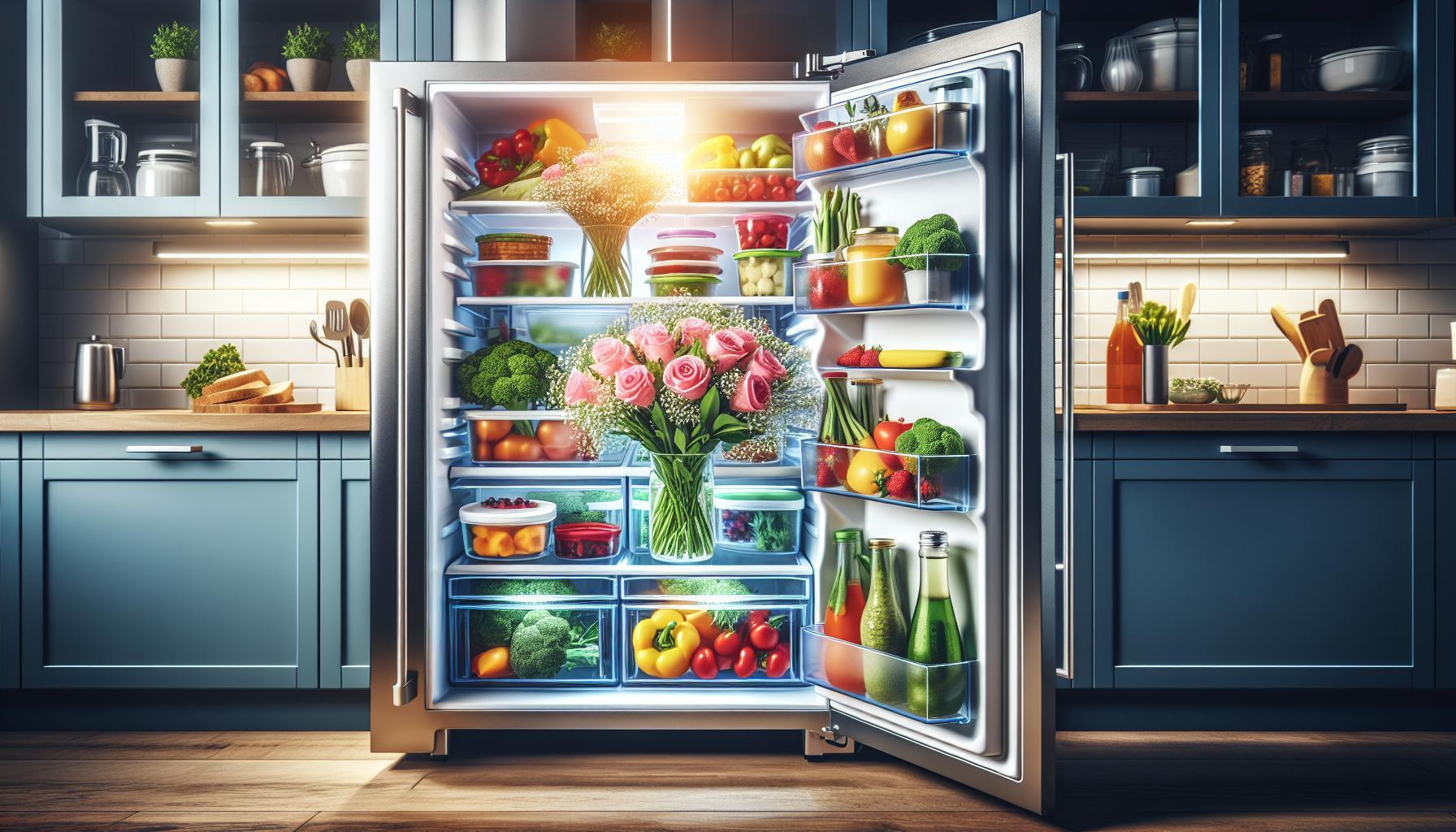Did you know that egg whites are not just a versatile component in many recipes but also a nutritious food source that can easily get overlooked? If you’ve ever wondered how long egg whites last in the fridge, understanding their shelf life is crucial to avoid waste and spoilage. After all, nobody wants to throw away perfectly good ingredients!
By knowing the correct storage practices and timeframes, you can enhance your cooking while ensuring food safety. Whether you’re using egg whites for baking, making a frittata, or preparing a healthy dish, this guide will help you maximize freshness and flavor. Stay with us as we explore how to store egg whites properly and answer your pressing questions, allowing you to cook with confidence and reduce food waste in your kitchen.
How Long Do Egg Whites Last in the Fridge?
Egg whites are a versatile ingredient often used in cooking and baking, but knowing how long they last in the fridge is crucial to maximizing their use while minimizing waste. When stored properly, raw egg whites can be refrigerated for up to four to five days. This timeframe ensures that they remain at their best quality and are safe to consume. It’s important to keep the egg whites in an airtight container to prevent any contamination or absorption of other odors from the fridge.
For leftover egg whites that have been separated from the yolks, label the container with the date they were stored to track their freshness easily. If you notice any unusual changes in color or consistency, it’s best to err on the side of caution and dispose of them. Egg whites can become increasingly difficult to use the longer they sit; thus, making sure to use them within the recommended timeframe will help maintain their quality.
In addition to timing, temperature plays a key role in the preservation of egg whites. Always keep your refrigerator at or below 40°F (4°C) to prevent bacterial growth. If you find yourself with an abundance of egg whites, consider freezing them for future use, which can extend their shelf life up to one year in the freezer. Always remember, food safety is paramount, so proper storage and timely consumption are critical in enjoying your cooking with egg whites while avoiding waste.
Understanding Egg White Storage Guidelines

Egg whites are a culinary powerhouse, known for their versatility in recipes ranging from fluffy meringues to protein-packed omelets. Understanding how to store them properly ensures they remain safe and delicious for your culinary creations. When kept at ideal temperatures and in appropriate conditions, raw egg whites can be refrigerated for up to four to five days. To maximize freshness, store them in an airtight container to protect against odors and potential contamination from other foods in your fridge.
A critical aspect of maintaining the quality of egg whites is proper labeling. Always jot down the date of separation when storing leftover egg whites, which makes it easier to keep track of their freshness. During storage, routinely inspect the egg whites for any signs of spoilage such as unusual color changes or off smells. If you encounter any abnormalities, it is wise to err on the side of caution and dispose of them, as consuming spoiled egg whites can lead to foodborne illnesses.
Temperature is paramount in the safe storage of egg whites. Ensure your refrigerator is set at or below 40°F (4°C), as this range inhibits bacterial growth that can compromise food safety. If you frequently find yourself with excess egg whites, freezing them is an excellent option. When frozen properly, egg whites can be kept for up to one year and can easily be thawed and used in various recipes, helping to minimize waste while ensuring you always have this versatile ingredient on hand.
Signs of Spoilage in Egg Whites

Recognizing spoilage in egg whites is crucial for maintaining food safety and ensuring that your culinary creations remain enjoyable and safe to eat. Fresh egg whites are typically translucent and have a slightly glossy appearance. However, as they age or if they are improperly stored, several telltale signs may indicate that they have gone bad.
First, a change in color can be a strong indicator of spoilage. If your egg whites turn cloudy or develop a pink, green, or yellow hue, it’s time to discard them. Fresh egg whites are clear, and any discoloration can suggest bacterial growth that poses a risk to your health. Additionally, textures can change as well; spoiled egg whites may become too watery or overly thick, deviating from the expected consistency.
Smell is another critical factor to consider. Fresh egg whites have a mild, neutral odor. If you detect a foul or off-putting smell, it is a clear sign of spoilage. Even a slight sour aroma is a warning that the product should not be consumed. When in doubt, it’s always better to err on the side of caution and dispose of any egg whites that exhibit unusual characteristics.
Lastly, proper inspection goes beyond visual cues. Always pay attention to the date marked on the container. If your egg whites are older than four to five days, regardless of their appearance, it’s safest to throw them away. Proper checking and understanding the signs of spoilage can help you avoid foodborne illnesses and maximize the freshness of your egg whites, ensuring your dishes are both safe and delightful.
Best Practices for Storing Egg Whites

Proper storage of egg whites is essential not only for maintaining their quality but also for ensuring food safety. Egg whites, when fresh, can enhance a variety of dishes with their versatility and nutritional benefits. To maximize their shelf life and usability, it’s crucial to follow a few .
When storing egg whites, always keep them in an airtight container to prevent contamination and moisture loss. Glass or plastic containers with tight-sealing lids work best, as they minimize air exposure, which can lead to spoilage. Label the container with the date of storage, which helps you track freshness easily. Aim to use egg whites within four to five days when stored in the refrigerator. If you don’t plan to use them within this timeframe, consider freezing them instead.
Temperature plays a vital role in the longevity of egg whites. Store them in the coldest part of the refrigerator, typically towards the back, rather than the door, where temperature fluctuations are more common. For those looking to extend the shelf life effectively, freezing egg whites is an excellent option. Just pour them into an ice cube tray, freeze until solid, and transfer the frozen cubes to a resealable freezer bag. This method allows for easy portioning and can keep egg whites safe for up to a year in the freezer.
In addition to these storage methods, always inspect egg whites prior to use, even if they’ve been stored properly. If you notice any changes in appearance, such as cloudiness or an off smell, it’s safer to discard them. Following these practices not only helps in reducing waste but also enhances your culinary endeavors with quality ingredients.
How to Extend the Shelf Life of Egg Whites
To ensure egg whites maintain their freshness and usability for as long as possible, it’s essential to implement proper storage techniques right from the moment you separate them from the yolks. One of the simplest yet most effective methods for extending their shelf life is to store them in a tightly sealed, airtight container. Optimal materials include glass jars or plastic containers designed for food storage, which prevent air and moisture from entering. By minimizing exposure to contaminants, you can keep egg whites fresh for about four to five days in the refrigerator.
If you find yourself with excess egg whites or want to keep them for a longer period, freezing is an excellent option. To freeze egg whites effectively, pour them into an ice cube tray, allowing for portion control once frozen. After they solidify, transfer the cubes to a resealable freezer bag, removing as much air as possible. This technique keeps egg whites safe for up to a year, making them readily available for your culinary needs whenever you require them.
Additionally, consider using a marker to label your containers with both the date of storage and the number of egg whites inside. This practice not only aids in tracking freshness but can also be invaluable when deciding how to incorporate them into recipes later. For optimal usage, it’s best to plan your recipes in advance, ensuring you utilize your egg whites while they are still at their best quality.
Finally, always inspect egg whites before use, regardless of how well they’ve been stored. Signs of spoilage include an off odor, cloudiness, or a watery appearance. If you notice any of these indicators, it’s safer to discard them. By following these straightforward steps and guidelines, you can maximize the shelf life of egg whites while minimizing waste, ensuring you get the most out of this highly versatile ingredient.
Safe Methods for Freezing Egg Whites
Freezing egg whites is a smart solution for those looking to extend their shelf life and reduce waste, allowing you to keep this versatile ingredient on hand for various recipes. When properly frozen, egg whites can last for up to a year while still retaining their quality. To begin, separate the egg whites from the yolks, taking care to ensure no yolk enters the whites, as fat from the yolks can affect the texture and stability of the whites when whipped.
One effective method for freezing egg whites is to use an ice cube tray. Pour the egg whites into each compartment, filling them just enough to allow for expansion. Once frozen solid, transfer the frozen cubes into a resealable freezer bag, removing as much air as possible to prevent freezer burn. Be sure to label the bag with the date and the number of egg whites inside; this not only helps in managing your stock but also provides a reference for recipes later on.
When you’re ready to use your frozen egg whites, safe thawing is crucial to maintain their integrity. Place the desired number of cubes in the refrigerator overnight to let them thaw slowly. For quicker results, you can also place the cubes in a bowl of cold water. It’s important to avoid defrosting at room temperature, as this elevates the risk of bacterial growth. Once thawed, gently stir the egg whites to recombine any liquid that may have separated, and they will be ready for use in your favorite dishes-from meringues to omelets.
By freezing egg whites appropriately, you can enjoy their benefits well beyond their initial shelf life in the fridge while always having them on hand for your culinary needs. This proactive approach not only minimizes waste but also offers the convenience of pre-portioned ingredients, making meal preparation more efficient and enjoyable.
Defrosting and Using Frozen Egg Whites
When you have frozen egg whites on hand, knowing the best ways to defrost and use them is essential for making the most of this versatile ingredient. Proper thawing is key in preserving their quality and ensuring that you can whip them effectively for recipes like meringues or soufflés. It’s crucial to treat frozen egg whites with care; their structure may change if thawed improperly, leading to disappointing results in your cooking or baking.
To safely thaw frozen egg whites, begin by transferring the desired number of frozen cubes to the refrigerator. This slow thawing method allows the egg whites to come back to a usable state without risking bacterial growth, which can occur if they are left at room temperature. For those who need quicker access, placing the frozen egg whites in a bowl of cold water can expedite the process. Avoid using hot water or defrosting them in the microwave, as these options can quickly heat the eggs and negatively impact their texture.
Once fully thawed, it’s common for some separation to occur, where the liquid may gather at the bottom. Gently stir the egg whites to recombine any separated liquid before using them in your recipes. This step is important to restore the consistency, especially if you plan to whip them to form peaks. Thawed egg whites can be used just as you would fresh egg whites, lending themselves beautifully to baked goods, omelets, or even protein-rich smoothies.
Using frozen egg whites not only helps reduce waste but also opens up a world of culinary possibilities. By planning your portioning and storage strategically, you can always have egg whites ready for your cooking endeavors. Whether it’s for a fluffy meringue or enriching a savory dish, knowing how to properly defrost and utilize your frozen egg whites ensures that you maintain quality and enjoy the full benefits of this nutritious food source.
Common Myths About Egg White Storage
Egg whites are a kitchen staple loved for their versatility and health benefits, yet misconceptions about their storage can lead to waste and spoilage. One common myth is that egg whites will last indefinitely in the fridge. In reality, fresh egg whites should be consumed within 2 to 4 days of storing them, while pasteurized ones can last up to a week. Ensuring proper storage in an airtight container is crucial to maintaining their quality, as exposure to air can degrade their texture and safety.
Another prevalent belief is that if egg whites develop a cloudy appearance, they have gone bad. However, cloudiness often indicates freshness, as it is a result of the proteins in the egg whites reacting with air. Instead, focus on the smell and the presence of any discoloration or unusual texture as indicators of spoilage. If in doubt, it is always better to err on the side of caution and discard any egg whites that appear questionable.
Many people also assume that freezing egg whites impacts their efficacy. In fact, freezing is an excellent way to extend their shelf life, allowing you to store them for up to a year. When ready to use, thaw them in the refrigerator or in a bowl of cold water to ensure they retain their valuable properties. By educating ourselves and dispelling these myths, we can efficiently enjoy the numerous culinary possibilities egg whites offer while minimizing waste.
Cooking with Expired Egg Whites: Is It Safe?
Cooking with expired egg whites can be a topic of concern for many home cooks. It’s important to understand that “expired” in this context typically refers to sell-by dates rather than safety dates. Egg whites can remain safe to use for a short time after their indicated date if they’ve been properly stored. Generally, fresh egg whites should be used within 2 to 4 days when kept in the fridge, while pasteurized versions can last up to a week.
When considering using egg whites that are slightly past their prime, it’s essential to perform a small inspection before cooking. Start by checking for any off-putting odors, which can indicate spoilage. Additionally, observe the texture and color; egg whites should ideally be translucent and somewhat viscous. If they appear overly watery, discolored, or have any noticeable lumps, it’s best to err on the side of caution and discard them.
To safely utilize slightly expired egg whites, employ methods such as cooking them thoroughly in recipes where they will be incorporated into dishes that require heat, such as meringues, soufflés, or custards. Heat effectively destroys harmful bacteria, making these dishes a good option for using those egg whites. However, if the egg whites are more than a week past their date or show any signs of spoilage, it’s advisable to dispose of them to ensure food safety.
In summary, always prioritize safety and quality when deciding to use egg whites that are beyond their recommended storage time. Trust your senses, and if in doubt, it’s safer to discard them rather than risk foodborne illness. By remaining vigilant and informed about your egg white storage practices, you can enjoy their culinary versatility without unnecessary waste.
Creative Ways to Use Leftover Egg Whites
There’s no need to toss out leftover egg whites after whipping up your favorite dish; these versatile ingredients can shine in many recipes. They offer a fantastic way to enhance dishes with their unique properties, especially for those looking to reduce food waste. Plus, egg whites are low in calories and fat, making them an excellent addition to various culinary creations.
One of the most popular ways to use leftover egg whites is by creating fluffy meringues. Simply beat the egg whites until stiff peaks form, then gradually mix in sugar. Pipe or spoon them onto a baking sheet and bake until they’re crisp and light-a satisfying treat that pairs beautifully with fruit or can be used as a cake topping. Another delicious option is to whip up a fluffy omelet or frittata, adding vegetables or cheese for a nutritious meal. Simply whisk the egg whites and cook them in a non-stick skillet, seasoning to taste.
For a creative baking project, you can use egg whites to make macarons or light sponge cakes, where their airy texture contributes to the final product’s rise and consistency. If you’re looking for a healthier snack, consider preparing protein-packed pancakes or waffles. Incorporate the egg whites into your batter to boost protein content while keeping it light and fluffy.
Eco-Friendly Tips to Minimize Waste
In addition to culinary uses, get into the habit of freezing leftover egg whites if you can’t use them right away. Pour them into an airtight container or ice cube trays, and label them with the date. Frozen egg whites can be stored for up to a year and are easily thawed in the refrigerator when you’re ready to cook. Thawing them gently helps maintain their structure, making them ready for your next kitchen adventure.
Making the most of leftover egg whites isn’t just good for your culinary repertoire; it also helps contribute to sustainable cooking practices by minimizing food waste. Whether baking, cooking, or freezing, these egg whites can elevate your dishes and delight your taste buds!
Eco-Friendly Tips to Minimize Waste
Making the most out of your kitchen ingredients can significantly reduce waste and contribute to a more sustainable lifestyle. When it comes to egg whites, many home cooks often find themselves with leftover portions after preparing dishes like custards or yolk-based sauces. Instead of discarding these nutritious components, consider a few practical and eco-friendly strategies to minimize waste while maintaining quality.
First and foremost, proper storage is crucial. If you have leftover egg whites, transfer them to an airtight container or ice cube trays and store them in the refrigerator. Unused egg whites can last up to four days in the fridge, but freezing them is a great way to extend their shelf life significantly. In fact, frozen egg whites can be safely kept for up to a year. Ensure to label the containers with the date to keep track of their storage time. When you’re ready to use them, defrost them safely in the refrigerator overnight, ensuring they maintain their functional properties for various recipes.
Here are some creative options for using leftover egg whites instead of letting them go to waste:
- Meringues: Whip them into fluffy peaks and bake until crisp for a delightful dessert.
- Protein Snacks: Incorporate them into pancakes or waffles to boost the protein content.
- Macarons: Use them to create these delicate French pastries, which prominently feature egg whites.
- Fluffy Omelets: Whip the egg whites and elevate your breakfast options by adding vegetables or cheese.
Lastly, consider sharing your surplus egg whites with friends or family, or even exploring community exchanges. This not only helps reduce waste but also reinforces a communal approach to cooking and food sharing.
By implementing these eco-friendly tips, you not only enhance your culinary repertoire but also contribute positively to reducing food waste. Make the most out of every ingredient, and transform what might seem like excess into culinary delights!
Frequently Asked Questions About Egg Whites
Using egg whites can be a great way to minimize food waste, and understanding their shelf life and storage can empower you in the kitchen. When stored properly in the refrigerator, egg whites can last up to four days. To maximize freshness, always transfer them to an airtight container immediately after separating them from the yolk. If you find yourself with more egg whites than you can use within that timeframe, consider freezing them. Frozen egg whites can be kept for up to a year, making it easy to have this versatile ingredient on hand for future recipes.
One common concern is whether egg whites are safe to eat after their expiration date. If stored in the refrigerator, you should use your senses to evaluate their safety. Fresh egg whites will have a clear, slightly viscous texture and a mild odor. If you notice any unusual smells, discoloration, or a watery consistency, it’s best to err on the side of caution and discard them. For those who plan to freeze egg whites, it’s useful to note that frozen egg whites do not spoil in the traditional sense but may lose quality over time; thus, keeping track of how long they’ve been in the freezer is important.
When it comes to thawing frozen egg whites, it’s crucial to do it safely. Always defrost them in the refrigerator overnight rather than at room temperature to prevent any potential bacterial growth. Once thawed, these egg whites can be used just as you would fresh ones-perfect for making meringues, soufflés, or added to baked goods for extra protein.
By understanding these key points about egg white storage, you can make informed decisions in your kitchen, ensuring that nothing goes to waste while experimenting with various recipes!
Frequently asked questions
Q: How can you tell if egg whites have gone bad?
A: To check if egg whites are spoiled, look for any discoloration, a sour smell, or an unusual texture. Fresh egg whites are clear and slightly viscous. If you notice any of these signs, it’s best to discard them to avoid foodborne illness.
Q: Can you use egg whites after the expiration date?
A: Using egg whites past their expiration date is risky. While they may still be safe a few days after, check for spoilage signs. If they look and smell fine, use them soon, but toss them if in doubt. For longer storage, consider freezing.
Q: What is the best way to store egg whites?
A: Store egg whites in an airtight container in the fridge to maximize freshness. Ideally, they should be used within 2-4 days. For longer preservation, freeze them in ice cube trays and transfer to a freezer bag when solid, extending their life up to a year.
Q: How long can egg whites stay out of the fridge?
A: Egg whites should not be left out of the fridge for more than 2 hours. Bacteria can multiply rapidly at room temperature, so if they’ve been out longer, it’s safer to discard them.
Q: Can you freeze raw egg whites?
A: Yes, you can freeze raw egg whites. Pour them into an airtight container or ice cube tray for easy portioning. Freeze them for up to a year, and thaw in the refrigerator before use for best results.
Q: What is the difference between fresh and pasteurized egg whites?
A: Fresh egg whites are raw and can carry bacteria, while pasteurized egg whites have been heat-treated to kill pathogens. Pasteurized egg whites can be used in recipes that don’t cook them, making them safer for consumption raw.
Q: How should you defrost frozen egg whites?
A: To defrost frozen egg whites, transfer them from the freezer to the refrigerator overnight. This slow defrosting method keeps them safe for use. Avoid defrosting at room temperature to prevent bacterial growth.
Q: Can leftover egg whites be reheated for use?
A: Yes, leftover egg whites can be reheated. Ensure they are heated thoroughly until hot to reduce the risk of any bacteria. Incorporate them into dishes like omelets or frittatas to enjoy their nutritional benefits.
To Conclude
To maximize the freshness and safety of your egg whites, remember they can last up to four days in the fridge once opened, so always check for any signs of spoilage. If you’re looking for ways to minimize waste, consider freezing your egg whites for future use. Feeling unsure about how to store them? Explore our detailed guide on “Storing Egg Whites Safely” or check out our tips on “Mastering Egg Recipes for Every Meal.”
Don’t forget to sign up for our newsletter to receive the latest updates and cooking tips directly in your inbox. Your culinary adventures await, and we’re here to ensure you make the best choices for your kitchen! Share your experiences with us in the comments below, and let’s keep the conversation going. Together, we can avoid waste and make the most out of our kitchen staples.





